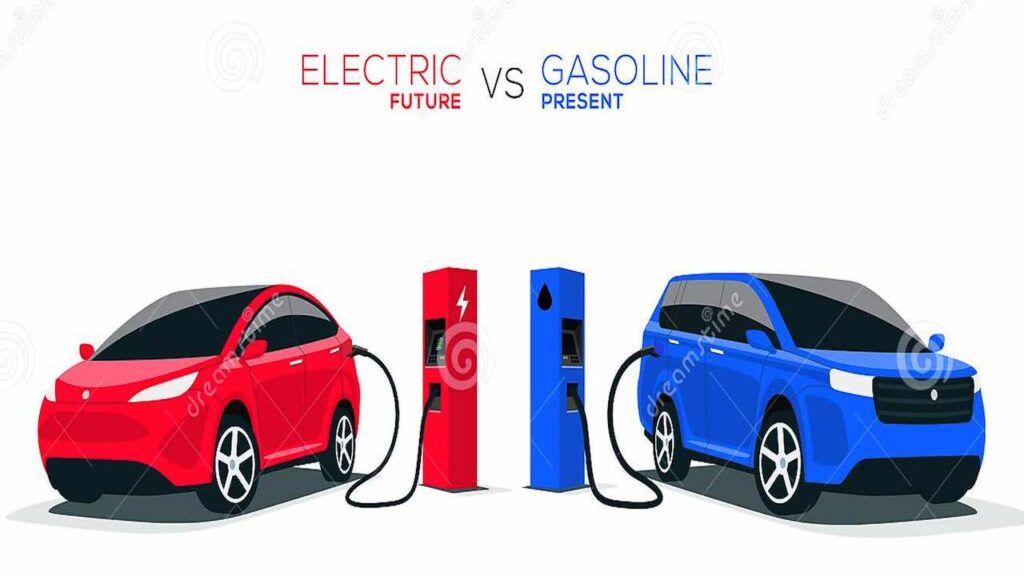With people beginning to experience the electric car revolution around them, the natural question is a comparison with the traditional gas cars.
The electric car vs gas car debate comes naturally if you are even remotely privy to the latest developments around yourself in the global automobile industry. Electric cars are here and for good. There is almost nothing left in the development of an internal combustion engine to make them comply with the ever-stringent becoming emission regulations in every part of the world. The future, that people used to associate electric cars with, is here. Are you ready to upgrade?
You might also like: Are Electric Car Chargers Universal – Types of Chargers

Electric vs Gas Cars
Gas cars have been around for over a century. The steam engine and later on, fuel in the form of petrol and diesel were the sources for generating power in gas cars. Electric cars, on the contrary, receive power from a battery that is generally placed under the floor of the vehicle. It supplied power to the electric motor, in turn powering the wheels. This is the basic difference of how the power is generated in both these types of cars.
Emissions Difference
The traditional fuels are derived from natural resources where petrol and diesel burn to produce energy. This leaves a large chunk of carbon in the form of exhaust emissions. Internal combustion engines (ICE) are only around 25-30% (petrol) and 30-40% (diesel) efficient. This naturally means that the majority of the energy produced by ICE-power cars goes waste and causes pollution. To tackle this, electrification was introduced.
With electric vehicles, there is no fuel involved and no emissions. However, it must be understood that the carbon emissions required to produce electricity and batteries need to be taken into consideration which is referred to as source-to-tank. There are emissions involved in this process. But at the end of the day, companies are working on developing recyclable battery packs with less use of toxic metals in the composition of cells. Also, electricity is being produced by renewable sources like windmills, solar energy and hydro energy.
You might also like: Is Electric Car Battery Safe, Fireproof, Waterproof and Short Circuit Proof?
Price Difference
While the technological feasibility is for the OEMs to take care of, the cost of the final product is what the regal people are concerned with. All zero-emissions narratives and carbon neutrality targets mean nothing if people are not able to afford electric cars. In this aspect, the EV version of a regular car costs around over 50% more for the same car model. This is a huge mark-up for the customers to bear.
As with every technology, the costs associated with it come down when the volumes go up. As far as the EV space is concerned, we are still at a relatively nascent stage. There needs to be a lot of work done to improve battery manufacturing and capacity, charging infrastructure, EV manufacturing costs, etc. for electrified cars to become a mass market. But the governments across the world are offering incentives and benefits to promote EV adoption.
On the other end of the spectrum, the auto manufacturers have come up with aggressive and ambitious plans to quit manufacturing ICE-powered vehicles by the end of the decade. Hence, you must get ready to embrace this EV wave that seems to be inevitable. These are some points to be considered in this electric car vs gas car debate.

Pingback: One day Phi Phi islands Trip from Phuket
Pingback: saคาสิโน
Pingback: แทงบอลสด มันทุกนัด ถอนได้ไม่มีอั้น
Pingback: Cristal Navigera (Alpha-PVP)
Pingback: gambia senegal
Pingback: dultogel
Pingback: sci diyalaa
Pingback: nagatop situs scam
Pingback: see
Pingback: เครื่องทําสเลอปี้
Pingback: Museum Mystery
Pingback: เครื่องเป่าแอลกอฮอล์
Pingback: สล็อต 1688 เว็บตรง วอเลท
Pingback: พลาสติกปูพื้นก่อนเทคอนกรีต
Pingback: visit
Pingback: additional hints
Pingback: zoloft and prozac
Pingback: how can i get urispas no prescription
Pingback: vegus666
Pingback: โบลเวอร์ kruger
Pingback: look
Pingback: 78win
Pingback: เนอร์สซิ่งโฮมต่างจากบ้านพักคนชราอย่างไร
Pingback: คลินิกกายภาพบำบัด ใกล้ฉัน
Pingback: เอเจนซี่ศัลยกรรมจีน
Pingback: Outing trip
Pingback: นำเข้าสินค้าจากจีน